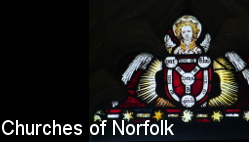| |
|
St
Michael, Langley
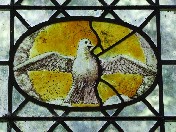 |
|
This
is a strangely remote part of East Anglia, the
uncompromising rivers dictating the landscape,
and the roads rushing through to Norwich without
much regard for the villages and hamlets lost in
the rolling meadows and copses beyond. Not far
from Langley is the slightly bizarre sight of the
huge sugar beet refinery at Cantley, midway
between Norwich and Yarmouth on the River Yare.
My grandfather worked there when he first came to
East Anglia in the 1930s. It was always inended
to be reached by river and rail rather than road.
Langley is on the other side of the river, and
although the silos and chimneys appear from time
to time above the rise, this is a quiet place,
one of the small, ancient parishes created very
early on in the colonisation of this island by
the English. In the 18th Century, rich
landowners found this secretive area ideal for
farming, shooting, and the conducting of
extra-marital affairs, and so there are big
country houses, some of them spectacular, and
again relatively little known. Here at Langley is
the splendid Langley Park, built by Matthew
Brettenham for the Berney family, and today an
exclusive public school. At the other end of the
parish, on the banks of the river, are the
remains of Langley Abbey, and in between the two
sits the church.
|
St Michael
is enclosed within its own copse of trees, only the top
of the tower giving the secret away. Nearby is Langley
Grange, splendid enough in its own way, where we found
the key to the church. To get to the church, you have to
cross a broad meadow on foot, and part of the way across
is an intriguing memorial stone for the journalist
Deborah Hutton, who died in 2005 at the age of 49. The
inscription reads And if I
could ask you just one more thing It would be to go out
and do a little kindness. Deborah 13 July 2005. I
thought this was touching and lovely, and still deep in
thought I squeezed through the narrow gap into Langley
graveyard.
The church is perhaps not the most
attractive or exciting in Norfolk, but it possesses a
quiet gravitas in this enclosed space. The exterior
character of the church comes from a rebuilding in the
14th century and a restoration very early on in the 19th
century. Almost certainly, there was a Norman church here
once, and before that a wooden Saxon one, for these are
the oldest English parishes of all. But the important
thing about Langley church is inside, for this is one of
several churches in this part of Norfolk which are home
to parts of the Beauchamp Proctor collection of
continental stained glass, and this is the largest and
best grouping of them. The Beauchamp Proctors lived at
Langley Park in the late 18th and early 19th Centuries,
and the glass, much of it from Rouen in France, was
imported for them by JC Hampp of Norwich. As with
Chedgrave and Thurton, it was installed by the early
Lowestoft stained glass designer Samuel Yarrington, and
probably restored in the 20th Century by the King
Workshop of Norwich. The best are the roundels, and the
best of these depicts Mary Magdalene meeting the Risen
Christ in the garden and mistaking him for the gardener -
not surprisingly, perhaps, as he wears a gardener's hat
and carries a spade. The best of the larger panels
depicts the shepherds on the hillside with the angel
appearing to tell them of the birth of Christ: one of the
shepherds sits and plays his bagpipes.
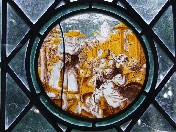 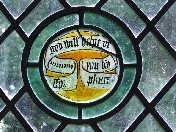 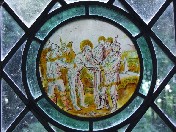 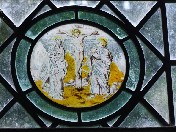
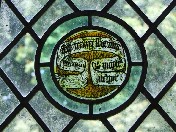 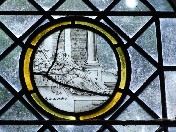 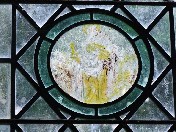 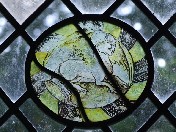
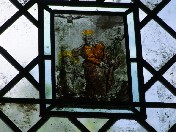 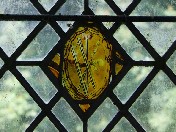
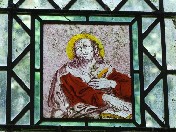 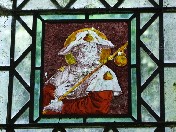
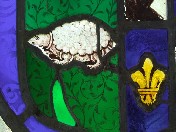 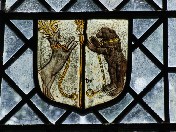 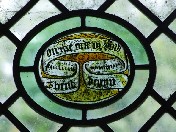 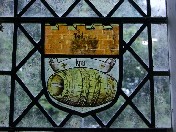
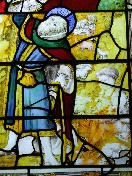
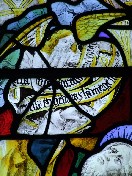 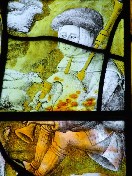 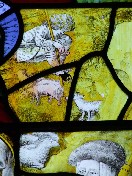 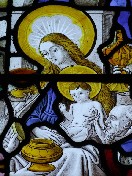 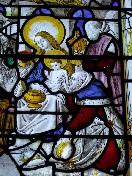
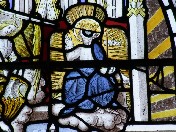 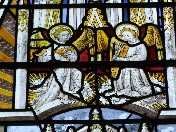 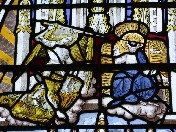 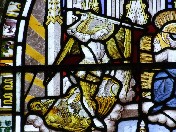
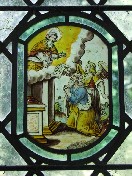 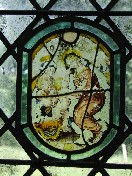 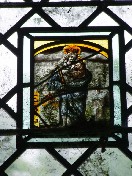
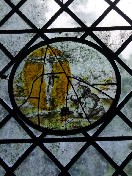
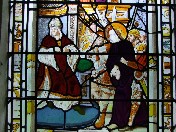 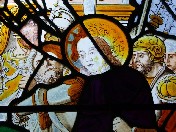
The
chancel was rebuilt as part of the early 19th Century
restoration. Pevsner says it was re-Gothicized in the
later C19, but it retains its Georgian character
under a ceiled roof, which was unfortunately breaking
away and falling to the floor at the time of my visit,
the whole east end of the church cordoned off as a
consequence. But I took my life in my hands to photograph
the glass you see above.
| The
interior of the church is rather gloomy, I fear,
and this was a sunny day. Still, this lends a
seriousness to the Beauchamp Proctor memorials in
the chancel. The best, and saddest, is to the
children of Sir William and Dame Anne, who died
in the 1820s. One of them, the six year old Emma,
died in Paris, and was buried at Pere La Chaise. The war
memorial opens like a triptych, and the names
painted on it must have been of estate workers,
mostly. It seems inconceivable today that such a
small, lonely and sparsely populated parish could
have lost so many of its young men.
Nearby
is a curiosity: a blank recess in the south nave
wall, covered by an ornate grill. The headstops
appear 14th Century. What on earth was it for?
|
|
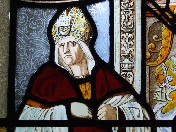 |
|
|
|
